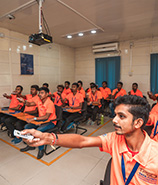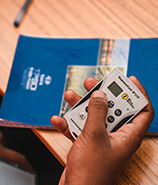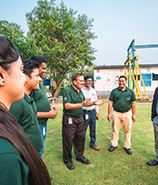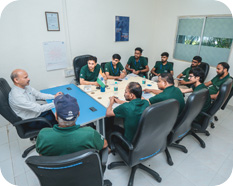Depending on the course, and the knowledge and skill level it targets, the assessment may comprise all or one of the following:
At TPSDI, the faculty uses objective-type knowledge tests for pre-tests, continuous assessments and post-tests. The pre-test and post-test scores give a good indication of the impact of the training on the students. The continuous evaluation ensures that the students are always prepared to act and allows TPSDI to identify any areas of concern for a batch. It enables them to take corrective measures such as devoting more time to some topics in the syllabus and providing additional practice time to hone some of the skills.
Additionally, TPSDI uses a Hand-Held Assessment Tool (HHAT) for objective-type tests. The HHAT is an intelligent technology employed by TPSDI to deploy assessments to large groups of people, and the test results are also available instantaneously, which makes it highly convenient. The device resembles a small remote control with alpha-numeric buttons corresponding to different answer options. The questions are displayed on a screen, and trainees only have to click buttons on their HHAT device and automatically, the responses are recorded. This device is a boon for trainees with low literacy who may need help understanding the written word or taking paper-based tests.




TPSDI conducts oral viva-voce examinations for some trades. These tests allow our expert faculty to measure and evaluate the behavioural traits of the student trainees and their response to hypothetical situations and emergencies.


The expert faculty and experienced demonstrators at TPSDI conduct and supervise practical tests to assess the skills and proficiency levels of every student trainee in performing various tasks in a job. Additionally, these tests measure if the trainee executes a task following the prescribed procedure and maintains necessary safety standards.


As part of the TPSDI coursework for soft-skills/non-technical courses, students must submit written assignments showcasing their ability to apply the knowledge and how they can use it in real-world scenarios.


Certificates of participation are granted to participating students/trainees upon completion of courses that aim to increase their knowledge and awareness levels. They do not include any assessment or assignment that would affect the outcome.
Certificates of Achievement are granted to students/trainees for courses targeting knowledge and skills. Toward the end of the course, the trainee's knowledge and skills are evaluated through a combination of objective-type tests, viva voce, practical tests and assignments.
For a trade, these certificates also mention the TPSDI level (aligned to the National Skills Qualification Framework [NSQF] levels) for which a trainee has taken the course and qualified.




